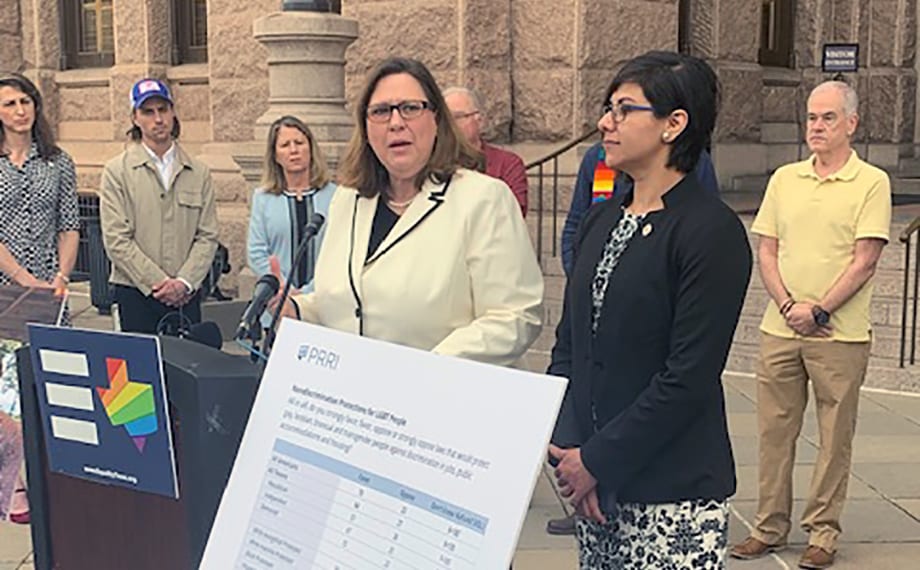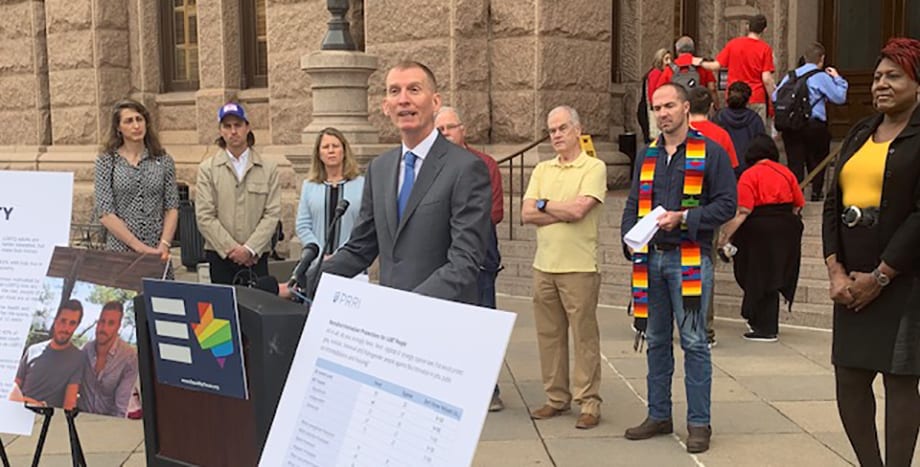
State Rep. Julie Johnson of Dallas speaks at the Equality Texas press conference Wednesday morning as state Rep. Jessica Gonzalez, right, looks on. (Photo by James Russell)
James Russell | Contributing Writer
james.journo@gmail.com
A report released today (Wednesday, Feb. 27) by Equality Texas reveals the barriers to LGBTQ equality in the state and calls for comprehensive nondiscrimination legislation to protect the estimated 930,000 Texans identifying as LGBTQ.
The report was unveiled at a press conference this morning on the steps of the Texas Capitol. Speakers included state Rep. Mary González, D-El Paso, state Reps. Julie Johnson and Jessica Gonzalez of Dallas, Visit Dallas President Phillip Jones, Houston transgender activist Monica Roberts and others.
According to an analysis by the Public Religion Research Institute, 64 percent of Texans support non-discrimination laws for LGBTQ people.
“That strong support is consistent across political party, religious affiliation, demographic group and region of the state,” the report states. “Similarly, a solid majority of Texans oppose laws that permit religiously motivated discrimination.”
But that public support has not translated into policy. Texas is still far behind its neighbors, including New Mexico.
Despite its large LGBTQ community, Texas is one of 28 states without statewide protections for LGBTQ people in employment, housing and public accommodations. Though many cities and government entities have nondiscrimination ordinances, the patchwork of protections leave many Texans vulnerable to violence, economic disadvantage and homelessness.
“It’s shocking to realize that in 2019, our state laws prohibiting unfair discrimination still don’t include LGBTQ Texans,” said González, an out pansexual woman and chair of the new LGBTQ Caucus. “The time is now to protect all Texans equally. Updating our laws to help end unfair discrimination is long overdue.”
Data analyzed by the Williams Institute at the UCLA School of Law, a think-tank studying LGBTQ issues, concluded that LGBTQ adults in Texas are more likely than other Texans to report having insufficient resources to buy food or meet their healthcare needs. Approximately 30 percent live in poverty, for instance.
The statistics are worse for LGBTQ people of color. Texas’ rates of poverty mirror the country’s, especially for transgender and gender-nonconforming people of color.
A record 30 openly-LGBTQ candidates ran for office in the last election cycle. Two openly-lesbian/bisexual/pansexual members were re-elected to the Texas Legislature — Gonzales and Rep. Celia Israel, D-Austin — while two new openly-lesbian and one new openly-bisexual women were elected, more than doubling the number of openly-LGBTQ members in the 150-member Texas House.
Some of those members and their allies defeated hardline anti-LGBTQ lawmakers like Ron Simmons, the Carrollton Republican that authored last session’s bathroom bill targeting transgender people, and Matt Rinaldi of Irving. Simmons was defeated by Rep. Michelle Beckley, D-Carrollton, an LGBTQ ally who has since filed numerous bills supporting equality. Johnson, D-Dallas, is the out lesbian who defeated Rinaldi, a very vocal supporter of the bathroom bill last session.

Visit Dallas Phillip Jones speaks at the Equality Texas press conference on Wednesday morning as Houston transgender activist Monica roberts, far right, and others look on.
Despite the bits of progress, transgender and gender-nonconforming Texans still face barriers to voting thanks to a strict voter identification law. Their main barrier remains changing the gender marker and name on their voter cards, and it is a costly and complex obstacle.
“Texans who can afford to hire a lawyer can typically obtain a court-ordered name and gender marker change to update identification documents, but that process is out of reach for many,” the Equality Texas report notes.
Three bills have been filed in the current legislation session that would make the process easier. One of them is Senate Bill 154 by Sen. Jose Rodriguez of El Paso, who also filed SB 151, a comprehensive non-discrimination bill that includes LGBTQ protections.
Rodriguez’ SB 151, House Bill 244 by Rep. Jessica Farrar, D-Houston, and HB 254 by Rep. Diego Bernal, D-El Paso have all been referred to the powerful State Affairs committees.
Those are among the 28 bills supporting LGBTQ equality filed so far. Others include multiple bills repealing the marriage and sodomy ban language in the Texas Constitution, comprehensive protections and a ban on reparative therapy for children 18 and younger.
While new Speaker of the House Dennis Bonnen, a Republican, pledged to steer away from social issues this session, lawmakers have already filed several bills discriminating against LGBTQ people. Those include HB 1035 by Rep. Bill Zedler, R-Mansfield, a sweeping bill allowing discrimination based on religious beliefs, which was referred to State Affairs Tuesday, Feb. 26.
Those discriminatory bills disturb Griff Martin, senior pastor at First Austin, A Baptist Community of Faith. “Religious freedom is one of the founding values of our nation but is not a license to discriminate,” he said.
Rodriguez, an LGBTQ ally, said the time for protections is now.
“Texas is diminished when it sanctions the denial of housing or employment for LGBTQ Texans or fights to keep unconstitutional and unenforceable laws on the books,” Rodriguez declared. “I will continue filing bills to ensure that all Texans are afforded their constitutional rights. Simply put, gay and trans Texans have the same values as anyone: to be secure in their livelihoods and to live a life of purpose, free from public discrimination.”











